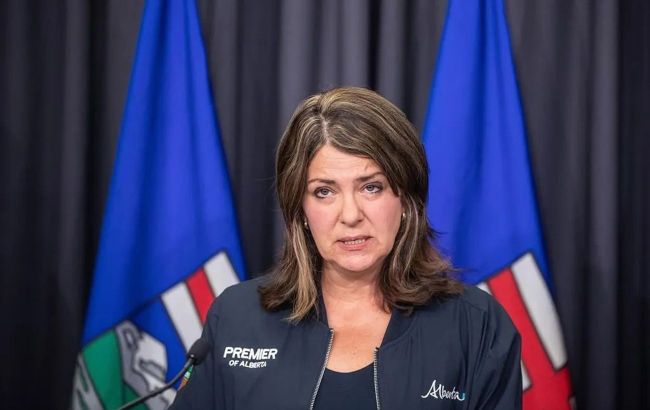Canada faces potential loss of oil-rich region: Reason behind
 Photo: Premier of Alberta Danielle Smith (The Canadian Press)
Photo: Premier of Alberta Danielle Smith (The Canadian Press)
Residents of the province of Alberta have registered a petition for the region to separate from Canada. Everything will be decided in a referendum, the Associated Press reports.
The Premier of the Canadian province of Alberta, Danielle Smith, stated that a referendum on separation from Canada will be held in 2026 if the citizens' petition gathers the required number of signatures.
The Head of the government noted that she personally does not support the province's secession from Canada and expressed hope for a "path forward" for a strong and sovereign Alberta within a united Canada.
"Should Ottawa, for whatever reason, continue to attack our province as they have done over the last decade, ultimately that will be for Albertans to decide. I will accept their judgment," Smith said.
She made this statement just one week after Prime Minister Mark Carney led the Liberal Party to form a fourth consecutive federal government. This is also happening at a time when US President Donald Trump continues to threaten Canada with tariffs and with turning the country into the 51st state.
Smith's United Conservative government recently introduced legislation that, if passed, would lower the threshold petitioners need to meet to initiate a provincial referendum.
The bill changes the rules for holding a citizen-initiated referendum, requiring that the petition be signed by 10% of voters who were eligible to vote in the previous general election, compared to 20% of the total number of registered voters. Applicants will be given 120 days instead of 90 to collect the required 177,000 signatures.
Oil restrictions and chance for settlement
Smith accused previous federal Liberal governments of introducing various laws that limit Alberta's ability to extract and export oil, which she said has cost the province billions of dollars. She also said she does not want the federal government interfering in the province's affairs.
"We don't ask for special treatment or handouts. We just want to be free to develop and export that incredible wealth of resources we have. Freedom to choose how we provide health care, education, and other needed social services to our people, even if it's done differently than what Ottawa has in mind," the Premier of Alberta said.
Smith met with Canadian Prime Minister Carney and said he "had some promising things to say about changing the direction of his government’s anti-resources policies."
The Premier of Alberta also announced that her government will appoint a negotiation team to try to put an end to federal policies that have long frustrated the province. She will also lead the "Alberta Next" group, which will hold a series of town halls to hear ideas and complaints from Albertans.
Quebec factor
John Soroski, a political scientist at MacEwan University in Edmonton, said that although there is anger in the province, he is not sure it will lead to a vote for separation.
"These grievances are serious. I think the prospects of separation are highly unlikely," Soroski said.
In 1980 and 1995, the French-speaking province of Quebec held two referendums on separation, but both failed.
Soroski believes Smith may follow the example of Quebec politicians who used the threat of separation in their dealings with the federal government.
"I don't see Smith wants separation, but I think it's very useful for the province to have in its back pocket the idea that there's this large number of discontented Albertans," a political scientist said.
Smith also noted she will work with Carney "in good faith" but wants "tangible proof of real change."
In June 2025, the G7 summit will take place in the province of Alberta. Canadian Prime Minister Mark Carney invited Ukrainian President Volodymyr Zelenskyy to attend the meeting.
On April 28, early parliamentary elections were held in Canada. The main rivals in the race were the Liberal Party, led by Canadian Prime Minister Mark Carney, and the Conservative Party, led by Pierre Poilievre.
According to preliminary election results, the Liberals and the current Head of government, Carney, won.

